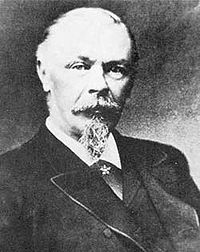Arthur von Oettingen Scientist
Arthur Joachim von Oettingen (28 March 1836 – 5 September 1920) was a Baltic German physicist and music theorist who was born at the Luua Manor (German: Ludenhof), Tartu County, Livonia. He was the brother of theologian Alexander von Oettingen (1827–1905) and ophthalmologist Georg von Oettingen (1824–1916).He studied astronomy and physics at the University of Dorpat, and furthered his education of physics in Paris in the laboratories of Antoine César Becquerel (1788–1878) and Henri Victor Régnault (1810–1878), and afterwards at Berlin in the laboratories of Heinrich Gustav Magnus (1802–1870), Johann Christian Poggendorff (1796–1877) and Heinrich Wilhelm Dove (1803–1879).In 1868 he became a professor at Dorpat, where he founded a meteorological observatory. In 1893 he moved to the University of Leipzig, where he remained until 1919 as a lecturer and honorary professor. In 1898 and 1904 he published the third and fourth volumes of Poggendorff's Biographisch-Literarisches Handwörterbuch der exakten Naturwissenschaften.Oettingen was a primary advocate of a theory of acoustical relationships known as "harmonic dualism". This concept was later expanded and elaborated on by musicologist Hugo Riemann (1849–1919). Oettingen is also credited for introducing a measurement of musical interval known as the millioctave.
Search
Scientist
| academic advisor | |
|---|---|
| Field of study |
